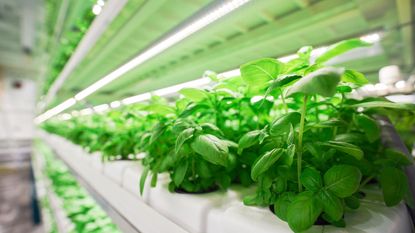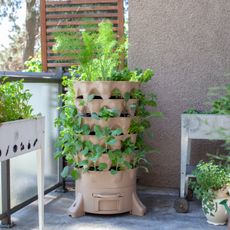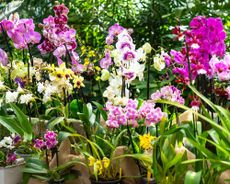What Are The Pros And Cons Of Hydroponics


Even if you've never read about hydroponics, you'll probably guess from the "hydro" that it involves water. Hydroponics is a gardening technique where you grow plants, including vegetables, without soil - using instead a mix of water and fertilizer. It's the cool new kid on the block, but like every other idea before it, hydroponics has advantages and disadvantages. Read on for a discussion of the pros and cons of hydroponics and decide if this method of gardening is right for you.
Advantages of Hydroponic Gardening
Mary's viewpoint: Hydroponics is a method of growing food using nutrient-rich water solutions instead of soil. Nearly any crop can be grown hydroponically any time of year. The benefits of hydroponics are numerous, and when it comes to weighing pros and cons, farmers, biologists and non-profit organizations around the world are convinced that the pros of hydroponics easily outnumber the downsides of hydroponic systems. Fresh, high-quality food for more people. Research indicates that hydroponic gardening's positive effects include higher yields of nutrient-rich foods. Food is grown locally and transportation costs are reduced substantially. Fresh, healthy food is more affordable for people who live in isolated communities or in arid regions where soil isn't suitable for growing food crops. Reduced water use in drought-ravaged areas. Hydroponically grown crops utilize a small amount of water which circulates in a closed loop system, delivering water straight to plant roots. Dependence on the weather is minimized and water use is reduced by as much as 70 percent. Hydroponics has the potential to solve many of the world's water problems. Food for densely populated urban areas. Hydroponically grown foods don't require vast acres of fertile land. Plants are grown closely together and crops can be grown in stacked systems, which saves space by allowing foods to be grown vertically. Rooftop farms are already producing food for city dwellers in the United States, Canada, China, Europe and Israel. Plants can also be grown hydroponically indoors. Jobs provide economic stability. Life is more stable and health is improved when people can grow food for themselves and their communities. Large hydroponic operations hire numerous employees to take care of packaging, shipping, maintenance, warehousing and sales. Reduction of the carbon footprint. Transporting food over long distance isn't a factor and energy is saved when food is produced locally. More energy is saved when crops require no intensive plowing, seeding, weeding, fertilization and cultivation. Hydroponic growing is hygienic, so diseases are limited. Because soil-borne pests are eliminated, no pesticides are required.
Disadvantages of Hydroponic Gardening
Teo's viewpoint: And now the bad news"¦you can run into problems with gardening hydroponically. It is not a perfect gardening system and it may not be right for you. So let's talk about the disadvantages of hydroponic gardening. Initial costs are high. A packet of seeds and a shovel can get you into gardening in the backyard, but you'll need to invest some green-backs before you see green shoots hydroponically. You need to invest in the set-up equipment if you want to make hydroponic gardening work for you. You'll have to purchase a light, containers, a pump and the nutrient solutions. Yes, you are looking at several hundred dollars at least to get started. It can be unforgiving. When you put in a veggies garden in your backyard, you have a little wiggle room. If you forget to water Monday, you can water Tuesday. If you don't feel like weeding this weekend, next weekend will do just fine. If you are the kind of person who needs this elbow room in terms of gardening responsibilities, you may well have problems with hydroponic gardening. If you are growing plants in water with nutrients, they must have that water and those nutrients or they will die. Their very survival depends on your punctual, reliable engagement. Yet another of the cons of hydroponics you'll face. Remember that the word hydroponics includes the Greek work for water, "hydro," but it also includes the Greek work for labor, "ponos." Your gardening labor time may be reduced to 10 minutes a day with a hydroponic gardening system, but failure to put in those 10 minutes can kill all your plants. Disappointments are inevitable. A whole other set of disadvantages of hydroponic gardening can be lumped under the term "disappointments." The system works great for some plants, but you won't have a 100% success rate. Your tomatoes might flower, but never fruit. Your peppers may fail. Your lettuce may refuse to grow at all. Diseases can spread through the nutrient solution and kill everything. In fact, there are no guarantees that your crops will all thrive. If you're a perfectionist, this may be one of the cons of hydroponics that sends you back to the soil.
How Do Hydroponic Gardening's Positive Effects Compare to its Cons?
True, it costs a bit to get started, BUT this is an initial cost that pays for itself in the long run. Most small-scale home gardeners won't even need that much to begin. With higher yields of nutrient-rich foods in a much smaller setting, and without all the plowing, seeding, weeding, fertilization, etc., who wouldn't opt for this gardening concept? And as far as disappointment goes, frankly, anyone that gardens period regardless of where or how is apt to suffer a few of these now and then. Overall, hydroponic gardening seems to have a lot of good things to offer but, ultimately, it boils down to the individual gardener.
Gardening tips, videos, info and more delivered right to your inbox!
Sign up for the Gardening Know How newsletter today and receive a free download of our most popular eBook "How to Grow Delicious Tomatoes."

A Credentialed Garden Writer, Mary H. Dyer was with Gardening Know How in the very beginning, publishing articles as early as 2007.
-
 Clever Vertical Vegetable Garden Ideas For Small Spaces – 7 Ways To Save Space
Clever Vertical Vegetable Garden Ideas For Small Spaces – 7 Ways To Save SpaceShort on garden space? Learn some vegetable garden ideas for small spaces that are fun and easy.
By Mary Ellen Ellis
-
 26 Different Types Of Orchids – With Pictures & Information
26 Different Types Of Orchids – With Pictures & InformationDiscover stunning orchid types to grow in your home and garden – from easy beginner varieties to rare and exotic species that are the preserve of experts.
By Melanie Griffiths